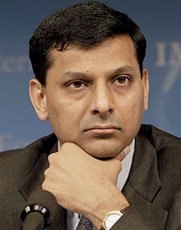India now better prepared for a US Fed rate hike: Rajan
01 Sep 2014
An increase in US interest rate is unlikely to trigger a withdrawal of foreign funds from the Indian market at a time when there are signs of an upturn in economic growth, the Reserve Bank of India (RBI) governor Raghuram Rajan said in an interview published on Sunday.
 Rajan`s comments to a leading English daily follows speculation over a likely hike in interest rate by the US Federal Reserve.
Rajan`s comments to a leading English daily follows speculation over a likely hike in interest rate by the US Federal Reserve.
The US central bank has been holding its key interest rate near zero since December 2008 and any decision to raise rate now will have implications for emerging economies like India, leading to capital outflows.
Capital outflows could put pressure on emerging market currencies, particularly in those economies with high current account deficits such as India.
The Indian rupee had in the past depreciated to levels around 70 to a dollar in the wake of the Fed's monetary stimulus measures. India has since taken action to correct its current account deficit and increase foreign exchange reserves.
"We certainly have done a great deal of preparation and are in a very different position from the summer of 2013," Rajan told the newspaper.
"My sense is that even when the Fed withdraws, people, after an initial bout of withdrawal, may consider India a good place to leave their money."
Rajan, who took over as RBI governorat at a time when the pressure on the rupee had become acute, has successfully steered the economy through the storm by taking steps to boost currency reserves and narrow the current account gap.
The rupee avoided a re-run of the crisis when the Fed actually began tapering last December.
Curbs on gold imports, such as higher duties, helped dramatically narrow India`s current account deficit to $32.4 billion in the fiscal year that ended in March from $87.8 billion a year ago.
India also built up its foreign exchange reserves, partly through measures that helped banks raise $34 billion in overseas loans and deposits from the non-resident Indians.
"We have plenty of reserves, but I see reserves as a second or third line of defence," Rajan said. "The primary line of defence is we should be attractive."
Rajan, a former chief economist at the International Monetary Fund who took over the reins at the RBI a year ago, left interest rates steady early this month, citing inflationary risks from the weak summer monsoon.
He wants to reduce India's retail inflation to 6 per cent by 2016 from near 8 per cent at present.
Latest economic data released on Friday showed India's gross domestic product (GDP) grew at its fastest pace in more than two years in the quarter ending in June.



















